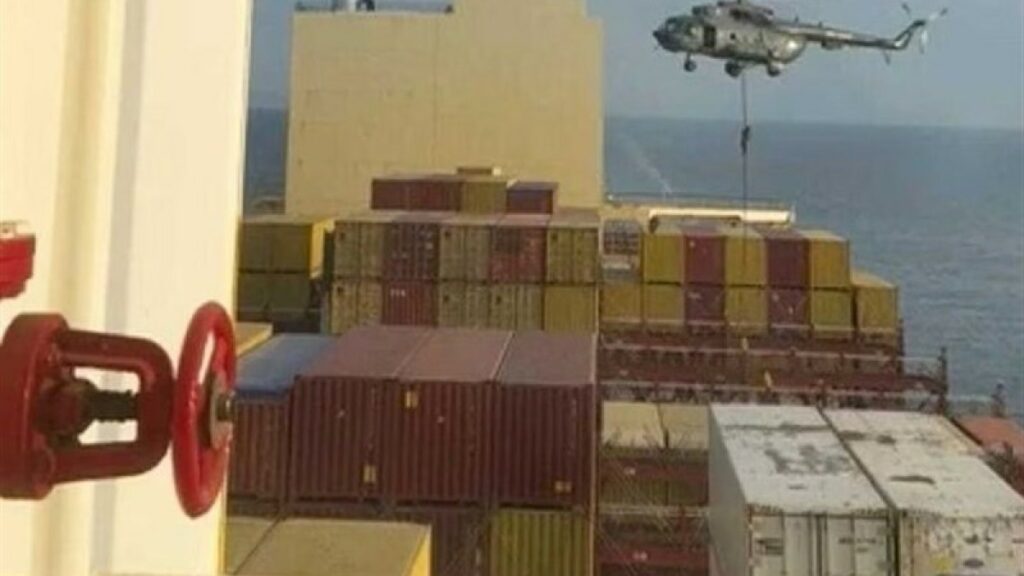Iran’s IRGC seizes ‘Israeli-linked’ ship near Strait of Hormuz
Tehran, Iran – Iranian armed forces have seized a container ship in the area of the Strait of Hormuz amid rising tensions across the region after a deadly Israeli attack on Iran’s consulate in Syria.
The ship was commandeered by the Islamic Revolutionary Guard Corps (IRGC), the elite force that lost seven members, including two generals, in the Syria strike, Iranian state media reported on Saturday.
“The ship has now been guided towards the territorial waters of our country,” state-run IRNA reported.
The vessel was identified as the Portugal-flagged MSC Aries, which reportedly departed from a port in the United Arab Emirates en route to India. It is associated with the London-based Zodiac Maritime, a part of the Zodiac Group run by Israeli billionaire Eyal Ofer and his family.
Footage from the deck of the vessel obtained by The Associated Press news agency on Saturday showed soldiers rappelling down from a helicopter.
The helicopter appeared to be a Soviet-designed Mil Mi-17, which is operated by the naval forces of the IRGC.
The United Kingdom Maritime Trade Operations (UKMTO) had said a vessel was seized by “regional authorities” 50 nautical miles (92km) northeast of the UAE’s Fujairah in a waterway vital to world trade.
Another Israeli-linked container ship was attacked and damaged by a drone in the Indian Ocean in late November, which the United States blamed on Iran.
Soaring regional tensions
The US military is moving more military assets to the Middle East as it anticipates an Iranian retaliation for the Israeli attack on the consulate in Syria.
A US defence official told Al Jazeera that the move is mainly aimed at better protecting US troops in the region, but also to ramp up regional deterrence.
US media confirmed the move but the Pentagon has not officially said which assets it is moving to the region.
The Wall Street Journal quoted unnamed US officials as saying on Friday that it includes repositioning two destroyers, with one of the warships already in the region and another redirected there.
US President Joe Biden said he expected an Iranian retaliation to come “sooner than later” and that Washington will continue to defend Israel.
“Don’t,” he said when asked by reporters if he had a message for Iran.
Since the start of the war on Gaza after the Hamas-led October 7 attacks in Israel, the US has sent thousands of bombs and ammunition to its ally Israel despite growing international criticism, along with moving warships and troops to the region.
John Kirby, the White House’s national security spokesman, said on Friday that Iran’s threats to retaliate against Israel remain “real” and viable”.
General Erik Kurilla, the head of US Central Command in the region, arrived in Israel on Friday to discuss a potential Iranian attack and met with top officials, including Israeli military chief of staff Herzi Halevi.
Israeli military spokesperson Daniel Hagari said that “Iran funds, trains, and arms terror proxies across the Middle East and beyond”, adding that the Islamic Republic “doesn’t just threaten the people of Israel, Gaza, Lebanon, and Syria”, but “fuels the war in Ukraine and beyond”.
He said that Israel was on “high alert” and was “prepared to respond” to what he called “any Iranian aggression”.
#Irans #IRGC #seizes #Israelilinked #ship #Strait #Hormuz
Long-term Implications and Future Developments
The seizure of the Israeli-linked ship by Iran’s IRGC near the Strait of Hormuz has significant long-term implications for the region and international relations. This incident adds to the escalating tensions between Iran and Israel, as well as the United States, with potential ripple effects across the Middle East and beyond.
1. Escalating Conflict:
The seizure of the ship is likely to further escalate the conflict between Iran and Israel. Iran’s actions are viewed as retaliatory for the deadly Israeli attack on Iran’s consulate in Syria. This tit-for-tat escalation could lead to further military confrontations and destabilization in the region.
2. International Response:
The international community, particularly the United States and its allies, is closely monitoring the situation. The US has already started moving more military assets to the Middle East in anticipation of Iranian retaliation. Diplomatic efforts will be crucial in preventing the conflict from spiraling out of control.
3. Economic Impact:
The seizure of the ship near the vital Strait of Hormuz could have economic implications, as it is a key waterway for global trade. Any disruption in maritime traffic in this strategic chokepoint could impact international shipping and energy supplies, leading to price hikes and market instability.
4. Regional Security:
The heightened tensions between Iran and Israel pose a threat to regional security and stability. The involvement of other actors, such as Hamas in Gaza and Hezbollah in Lebanon, could further complicate the situation. The risk of proxy conflicts and terrorist attacks remains high.
Actionable Advice
Based on these insights, it is crucial for all parties involved to exercise restraint and prioritize diplomatic solutions to de-escalate the situation. Dialogue and mediation efforts should be pursued to prevent further military clashes and potential humanitarian crises.
Furthermore, international organizations and stakeholders should closely monitor the developments in the region and be prepared to offer assistance in case of escalating violence or humanitarian emergencies. Economic sanctions and diplomatic pressure may be necessary to deter aggressive actions and promote peaceful resolutions.
In conclusion, the seizure of the Israeli-linked ship by Iran’s IRGC underscores the volatile nature of the geopolitical landscape in the Middle East. Immediate steps must be taken to prevent a full-blown conflict and mitigate the risks of further violence and instability.

